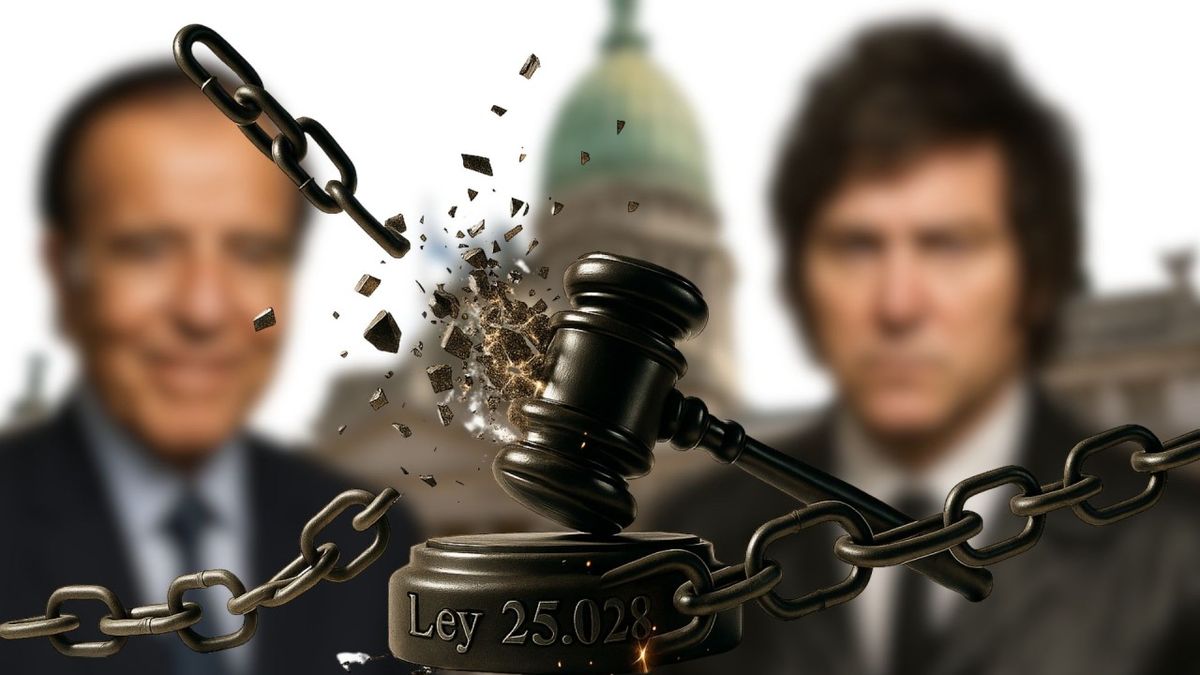Argentina, 1999. At the end of a decade defined by the economic openness, institutional modernization and productive deregulation, a demolishing coup was consumed in Congress against the free market model that, according to the works of Gerardo della Paolera, María Alejandra Irigoin and Carlos G. Bozzoli, had given rise to the best government of the Argentine history until then, when opening the ideas of liberal tradition after hyperinflation and statism of the 80s.
It was not a military coup, but it was surgical. It was not a revolution, but a constitutional betrayal. The National Congress, remembered by the very high levels of corruption, and pushed by what we would identify today as the “proto-stating regulatory”, specified The only revocation of a total veto during the two mandates of Carlos Menemand one of the few in all of the Argentine constitutional history: the parliamentary insistence on the Law 25.028which later gave rise to the “professionals” real estate schools, marked the interventionist turn in the sunset of the 1990s, and meant the turning point that interrupted the wave of economic freedom that the country had transformed.
The revocation to a total veto of the Executive Power is already in itself, a fact as unusual as it is transcendental. In a presidentialist system where the Executive Power controlled both chamber of Congress politically, managed to impose the lobby of a small group linked to the real estate sector, with enough “incentives” to distort the direction of the history of the market based on their own interests.
It was an episode as symbolic and structural: the first great ax of parliamentary socialism about the skeleton of menemism. And it was also the first beat of a slow but sustained institutional agony that would lead to the rise of statist radicalism, the catastrophe of 2001, and more than twenty years of regulatory, corporatist and decadent Kirchnerism. Law 25,028 was, in essence, the legislative genesis of the great Argentine tragedy.
The importance of the veto revoked in the present
And why is it key to remember this today, in full change of time? Because Law 25,028 was the founding stone of the real estate caste, the birth certificate of a collegiate structure that keeps the brokerage market kidnapped, an activity that by nature is pure commercial intermediation. With the false flag of professionalization, the corporate privilege was reinstated and the liberal principle was demolished that argued that, in a free market, to operate commercially it was enough with the will and responsibility, not with the coming of a politicized bureaucrat.
Carlos Menem, in full use of his constitutional powers, applied in 1998 a total veto to Law 25.028 through Decree 1279/98, considering it contrary to the spirit of deregulation that he had promoted since 1991. In his recitals, he clearly warned that the creation of colleges imposed artificial barriers, forced the provinces to adopt forced regulations, demanded university titles Unnecessary, he established territorial controls incompatible with an open society and set minimal tariffs that violated free competition, configuring an inadmissible price control.
He was right. And Congress, however, ignored it. In full political transition, and without public discussion or formal resistance, he revoked the presidential veto. The fact that this decision has been made without any debate in the enclosure (as stated in the 64th Meeting, 27th Ordinary Session of December 1, 1999, page 6495) symbolizes the silent consolidation of a corporate model that was imposed disguised as consensus.
On December 1, 1999, in the same week that Menem left the presidency, the Senate ratified the vetoed law. He did it under the pretext of “professionalization”, but in reality he institutionalized the corporate capture of the real estate market, giving the monopoly to the schools to turn the brokerage into a “science” armored by legal coercion.
Thus a new mechanism for extraction of resources without contribution of value was consecrated, disguised as academic legitimacy, and unprecedented in the history of Argentine and world trade: until today our country is the only one on the planet that comes to demand university degree to exercise real estate brokerage.
The outcome was as inevitable as devastating: the provinces were aligned in block with Law 25.028. Monopoly schools were born in each corner of the country, requirements as absurd as unnecessary flourished – such as the five -year “bachelor’s degree” in real estate brokerage required in article 1 of Law 11,084 of Entre Ríos -, a suffocating bureaucratic framework was configured, minimal prices were set by decree, and the free exercise of an essential activity was criminalized.
The market stopped responding to the logic of the competition and went through political thread. It didn’t matter who served, but who you sat down to negotiate. Thus, one of the key industries for economic development was kidnapped by the corporate logic of privilege.
On December 1, 1999, it was not simply the sanction of a law, it was the deregulator sleep death certificate that the Menemist era had sustained. That day, Congress decided that an Argentine of good could no longer exercise freely in the real estate intermediation market without accounts to a corporation. It was the first formal victory of Legislative socialism In democratic times after the ideas of economic freedom of the ’90s, the breakdown point in which the Parliament stopped representing the ideology of economic freedom to become a guardian of privileges and grave.
Deregulation in a change of time
Today, when so many wonder why the Argentine real estate market is expensive, inefficient and captured by anachronistic structures, the answer is not in the juncture: it is in history. The only revocation to the total veto of a law in the last 40 years was that December 1, 1999. It is an atypical fact even in Argentine democratic history, which crudely reveals the dimension of the interests that were put into play and the real power of the corporate structures that since then parasitate the market.
That same National Congress was, in retrospect, who consecrated the return of the regulatory state. The same state that later failed, which allowed the proliferation of privileges, and that raised corruption levels to convert them into a norm. The same one that is intended to clean up today. And the same that must be faced again, but this time without giving up a single comma.
History does not acquit those who, in order of order, destroy freedom. And on December 1, 1999, it was undoubtedly the first accurate coup against an Argentina that walked on the path of economic freedom. Today we have the memory, the diagnosis, and more than ever, the responsibility of reversing it.
Almost 25 years later, with a new national administration that has put into discussion the castes inherited from the past, there is the historical opportunity to retrace this path. The repeal of Law 25,028, or its structural reform, is no longer a utopia: it is an imperative need to return freedom to the real estate market and close the decadence cycle that this revocation enabled. Because the first veto revoked to the economic ideas of the 1990s was also a genesis and the first brick of the subsequent decline.
Former Innovation Director of the Argentine Real Estate Chamber (CIA) and CEO of Pint.
Source: Ambito
David William is a talented author who has made a name for himself in the world of writing. He is a professional author who writes on a wide range of topics, from general interest to opinion news. David is currently working as a writer at 24 hours worlds where he brings his unique perspective and in-depth research to his articles, making them both informative and engaging.




